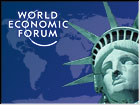|
WEF raises uncertainty
|
 |
February 4, 2002: 4:42 p.m. ET
The global economy and the U.S. role in globalization were among the questions raised.
By Staff Writer Mark Gongloff
|
NEW YORK (CNN/Money) - The World Economic Forum's 2002 annual meeting ended Monday, having raised more questions than answers.
For one thing, there was no consensus about the state of the global economy, aside from the fact that its fortunes are tied to those of the United States, and that the world's other big economies, Japan and Europe, need to fix their problems before they're strong enough to grow without a U.S. boost.
"Unfortunately, the global economy seems to be depending totally on the U.S. at the moment," Stanley Fischer, a former top official at the International Monetary Fund, told CNN/Money Thursday.
Many global economists speaking at the WEF weren't as sure as U.S. economists that the U.S. recession was over, and business executives -- including Microsoft Corp. (MSFT: down $1.54 to $61.12, Research, Estimates) Chairman Bill Gates -- were even more pessimistic.
Click here for more about WEF economic discussions
The spectacular collapse of Enron Corp. was a topic raised often at the meeting, and most participants agreed that fear about accounting irregularities threatened to increase uncertainty in world markets.
SEC Chairman Harvey Pitt spoke to CNN/Money Friday about the Enron scandal and defended himself from accusations that his plan to reform corporate accounting lacked "teeth."
And the CEO of PriceWaterhouseCoopers, one of the "Big Five" U.S. accounting firms, told CNNfn Friday that he hoped the accounting industry would move to a system based on principles rather than hard-and-fast rules.
Click here for more on the Enron scandal
More uncertainty was raised Friday by U.S. Secretary of State Colin Powell. According to the New York Times, Powell said that the United States, in fighting terrorism, was willing to take on "evil regimes," echoing President Bush's warning in Tuesday's State of the Union address about an "axis of evil" comprised of Iran, Iraq and North Korea.
The comments fueled growing international worries that the United States could shift its policy from the careful coalition-building that followed the Sept. 11 terrorist attack.
| |

|
|
| |
|
|
| |
So long, WEF. Please don't come back.
|
|
| |
|
|
| |

|
|
| |
|
|
| |
Sign in the window of Lexington Ave. tobacconist Barclay-Rex |
|
The Times also said Treasury Secretary O'Neill defended the Bush administration's decision to cut off financial aid to Argentina. With his skeptical comments at another workshop about financial aid to developing nations, including debt relief and health aid -- subjects dear to the hearts of the meeting's stars, Bono and Bill Gates -- O'Neill was the meeting's Ebenezer Scrooge, adding to international jitters about the part America will play in globalization.
In response to fears of developing nations -- and many of the protesters outside -- that the world's poor will be left behind by the developed world, forum organizers and participants stressed over and over again throughout the meeting the need to fight poverty, assist trade and improve health in developing nations.
"The challenge for business is to demonstrate its capacity to improve lives," Royal Dutch/Shell Group Chairman P. B. Watts said Saturday.
And while the WEF said globalization enjoyed a surge of support in the world after Sept. 11, it warned that support could disappear if globalization began to increase joblessness and poverty or hurt the environment.
Even as the WEF addressed anti-globalization fears, the anti-globalization protesters outside behaved themselves, for the most part.
Click here for more on the protesters
The biggest protests of the meeting, it turned out, came from members of the media, who were -- for the first time in the meeting's history -- kept away from the world leaders that are the main attraction of the meeting.
And though the meeting will return to Davos, Switzerland, in 2003, WEF organizers wouldn't guarantee that reporters would get the same access they enjoyed in previous meetings.
Click here for more on the media problems
New York City residents were relieved that violent protests, such as those seen at WTO meetings in Seattle and Genoa, Italy, did not occur. But many of them were also happy to see the meeting end, if only for the disruption it brought to a city still trying to heal from the terror attacks of Sept. 11.
"So long, WEF," said a handwritten sign in the window of Lexington Ave. tobacconist Barclay-Rex, a block from the meeting's Waldorf-Astoria venue. "Please don't come back."
"It's too soon after Sept. 11," explained the cigar-smoking clerk inside. "Business dropped off after Sept. 11, then it picked up at Christmas, and then this. Desolation. No tourists walking by, nothing." 
|
|
|
|
|
|

|

